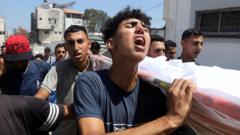In his first public statement following a ceasefire with Israel, Khamenei declared that the US strikes did not disrupt Iran’s nuclear capabilities, while US officials continue to assert that the attacks achieved significant damage. Tensions remain high as Iran threatens retaliation if attacked again.
Iran's Supreme Leader Claims US Strikes Were Fruitless

Iran's Supreme Leader Claims US Strikes Were Fruitless
In a recent address, Iran's Ayatollah Ali Khamenei asserted that the US gained nothing from military strikes on Iran's nuclear facilities, responding to contrasting US claims of success.
Khamenei emphasized that the US strikes failed to achieve their objectives, while also affirming Iran's nuclear ambitions are purely civilian. Furthermore, the Iranian parliament has tentatively moved to limit cooperation with the International Atomic Energy Agency, potentially escalating nuclear tension.
Iran's supreme leader has claimed that the recent US air strikes on its nuclear sites failed to achieve any significant results, emphasizing that Iran remains undeterred in its nuclear ambitions. In a statement made to the public after a notable period of silence, Khamenei contended that the US did not gain any strategic advantages, despite claims from US officials asserting that Iranian nuclear facilities had been severely damaged.
Addressing the attacks from a seemingly secure location, Khamenei stressed the resilience of Iran's nuclear program, pointing to a retaliatory strike on a US air base in Qatar as proof of Iran's capacity to respond to external threats. He cautioned that any further aggression from the US would be met with a substantial retaliatory cost. US President Donald Trump's assertion that the strikes had "totally obliterated" three critical nuclear sites in Iran stands in stark contrast to Khamenei's claims, contributing to a complex and ongoing narrative surrounding Iran's nuclear activities.
The regional conflict escalated into direct confrontations after Israel's Prime Minister warned of Iran’s potential to rapidly develop nuclear weapons. With a parliamentary bill recently passed to terminate cooperation with the International Atomic Energy Agency (IAEA), Iran signals a potential pivot away from disarmament discussions, igniting concerns about the future of nuclear diplomacy in the region. Meanwhile, reports of casualties have emerged as a result of the ongoing conflict, further complicating the narrative.
As tensions continue to mount, the international community watches closely, weighing the implications of Iran's defiance against heightened military presence and accusations of obstruction by both Israel and the US.
Iran's supreme leader has claimed that the recent US air strikes on its nuclear sites failed to achieve any significant results, emphasizing that Iran remains undeterred in its nuclear ambitions. In a statement made to the public after a notable period of silence, Khamenei contended that the US did not gain any strategic advantages, despite claims from US officials asserting that Iranian nuclear facilities had been severely damaged.
Addressing the attacks from a seemingly secure location, Khamenei stressed the resilience of Iran's nuclear program, pointing to a retaliatory strike on a US air base in Qatar as proof of Iran's capacity to respond to external threats. He cautioned that any further aggression from the US would be met with a substantial retaliatory cost. US President Donald Trump's assertion that the strikes had "totally obliterated" three critical nuclear sites in Iran stands in stark contrast to Khamenei's claims, contributing to a complex and ongoing narrative surrounding Iran's nuclear activities.
The regional conflict escalated into direct confrontations after Israel's Prime Minister warned of Iran’s potential to rapidly develop nuclear weapons. With a parliamentary bill recently passed to terminate cooperation with the International Atomic Energy Agency (IAEA), Iran signals a potential pivot away from disarmament discussions, igniting concerns about the future of nuclear diplomacy in the region. Meanwhile, reports of casualties have emerged as a result of the ongoing conflict, further complicating the narrative.
As tensions continue to mount, the international community watches closely, weighing the implications of Iran's defiance against heightened military presence and accusations of obstruction by both Israel and the US.





















